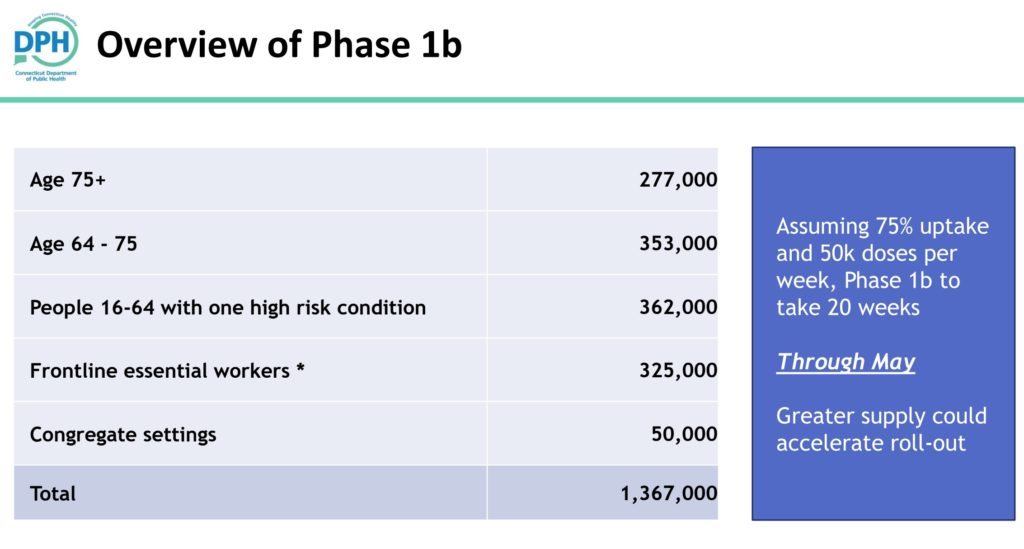State Expands COVID-19 Vaccine Access; Essential Workers in Target Groups

Connecticut is moving to the next phase of COVID-19 vaccine distribution, with essential workers across a number of sectors, including manufacturing, among the eligible groups.
The Lamont administration announced this week the move to Phase 1b, the second of three planned vaccination stages.

Phase 1a targeted healthcare personnel with the potential for direct or indirect exposure to patients of infectious materials; long-term care facility residents; and medical first responders.
Phase 1b includes:
- Those aged 75 or older
- Those between the ages of 65 and 74
- Those between the ages of 16 and 64 with comorbidities (cancer, chronic kidney disease, COPD, Down syndrome, heart conditions, weakened immune system, obesity, pregnancy, sickle cell disease, smoking, Type 2 diabetes)
- Individuals and staff in congregate settings (includes halfway homes, inpatient mental health facilities, corrections facilities, homeless shelters, domestic violence shelters, substance use and residential treatment facilities)
- Frontline essential workers
Vaccine Registration
The state is now accepting vaccine appointment registrations from those aged 75 or older and expects to expand registration to the rest of Phase 1b in the coming week.
The administration defines frontline essential workers as those who face work-related exposure to COVID-19 because their duties must be performed onsite, in proximity (less than six feet) to the public or to coworkers, and are in one of the following sectors:
- Healthcare personnel not included in Phase 1a
- First responders
- Agricultural workers, including farmworkers
- Food service and restaurants
- U.S. Postal Service workers
- Manufacturing workers
- Grocery store and pharmacy workers
- Public transit workers
- Food banks and meal delivery services for the elderly
- Education and childcare workers
- Solid waste and wastewater workers
- Inspectors working on site in the above locations
- Frontline public and social services
Officials have not yet finalized the definition of frontline essential workers, with the Department of Public Health reviewing the current recommendations.
May Target Date
In moving to Phase 1b, the administration accepted recommendations developed by the governor’s COVID-19 Vaccine Advisory Group, which includes public health officials, medical professionals, business leaders, lawmakers, and community leaders.
Phase 1b represents more than 1.36 million Connecticut residents. Since Phase 1a began Dec. 14, over 160,000 residents have been vaccinated.
Phase 1c represents the balance of the state’s population not covered in the first two phases.
Officials expect to vaccinate 50,000 people weekly in Phase 1b, with both the Pfizer and Moderna vaccines requiring two doses administered either 21 or 28 days apart.
With 75% of the eligible Phase 1b population expected to register for vaccinations, officials believe that stage will take 20 weeks to complete, through the end of May.
“I must continue to urge patience at this point in time,” Gov. Ned Lamont said this week.
“We know many people are excited to receive the vaccine and the promise of the future that comes with it, but we are limited in our ability to distribute them purely based on the amount we receive from the federal government.
“We are hopeful we will see increased allocations in the coming weeks and months, which will lead to even more light at the end of the tunnel.”
Employer Requirements
Employers with Phase 1b-eligible workers should enroll in the state’s Vaccine Administration Management System.
VAMS is a secure, web-based application for employers to register and share rosters of vaccine-eligible employees, with vaccination appointments later scheduled at designated clinics.
Organizations must designate an employer coordinator to register and share rosters, including the employee’s name and email address as appointment times and locations will be emailed to individual workers.
State guidelines require employers to:
“Use your judgment to make sure that the right people are getting access to the vaccine based on the definitions provided by state and federal government.
“Please coordinate with your employer coordinator to ensure the correct staff can schedule appointments. You do not have to show ‘proof’ or documentation that each employee belongs in Phase 1b.”
Vaccinated workers must continue to follow all state COVID-19 protocols, including mask mandates, social distancing requirements, and hygiene guidelines.
State health officials say larger companies that want to schedule onsite employee vaccinations can elect make their own arrangements with one of the following healthcare providers:
Employers who do not have employees eligible for Phase 1b do not need to take any action at this time.
Employers who have already registered with VAMS should have received an email notification from the state by the weekend of Jan. 16-17. Those who have not been notified should contact the DPH help desk.
Self-employed residents, independent contractors, or those not affiliated with an employer group who are eligible for Phase 1b, can register with VAMS to schedule a vaccination appointment.
Additional Information
- Eligible employees are notified by DPH (in English and perhaps Spanish) with vaccination clinic locations and appointment details
- Employees receive a vaccination card after the first dose, with a reminder to schedule their second dose
- A second dose is administered either 21 days after the first (Pfizer vaccine) or 28 days later (Moderna), with the vaccination card then updated
- Employees must bring a picture ID to their vaccination appointments
- Eligible employees hired after an employer submits a roster should be added to VAMS upon hire
- Employers can register out-of-state workers who work onsite at a Connecticut location
- Third-party contract employees should be registered by their direct employer, not the contracting firm
- Employers do not need to tier employees by risk factor or age when submitting rosters
- An employee diagnosed with COVID in the past 90 days should not be vaccinated until after that time
Health officials note that vaccinated workers must continue to follow all state COVID-19 protocols, including complying with mask mandates, social distancing requirements, and hygiene guidelines.
RELATED
EXPLORE BY CATEGORY
Stay Connected with CBIA News Digests
The latest news and information delivered directly to your inbox.


